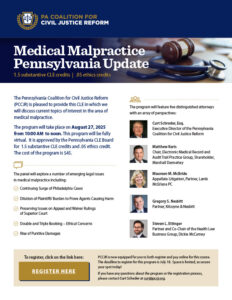Supreme Court considers Asbestos Liability| Largest Med Mal Award Reduced in Half| Fighting Back Against Meritless Climate Change Lawsuits| Climate Litigation Scorecard
Pennsylvania Supreme Court to Decide Important Questions of Asbestos Liability
The Pennsylvania Supreme Court has agreed to hear an appeal from a Superior Court decision, which found that the Fair Share Act applies to asbestos strict liability cases and that liability must be apportioned by fault as opposed to a per capita basis. In an order dated July 31, 2018 in Roverano v. John Crane, Inc. the Supreme Court framed the issues as follows:
- Whether, under this issue of first impression, the Superior Court misinterpreted the Fair Share Act 42 Pa.C.S. Sec. 7102 in holding that the Act requires the jury to apportion liability on a percentage basis as opposed to a per capita basis in this strict liability asbestos case?
- Whether, under this issue of first impression, the Superior Court misinterpreted the Fair Share Act in holding that the Act requires the jury to consider evidence of any settlements by the plaintiffs with bankrupt entities in connection with the apportionment of liability amongst joint tortfeasors?
Under Pennsylvania’s Fair Share Act, enacted in 2011, a defendant is only responsible for the percentage of liability assigned to them unless an exception applies. A notable exception requires a defendant to pay one hundred percent of the award if they are 60% or more at fault.
The Philadelphia Court of Common Please held that the Act does not apply to asbestos cases. The trial judge did not believe that asbestos exposure could be quantified. The Superior Court reversed the trial court’s finding. The Superior Court reasoned that the Fair Share Act applies to tort cases in which “recovery is allowed against more than one person, including actions for strict liability.” Asbestos does not fall under any of the exceptions found in the act and the language of the act itself states that it applies to actions for strict liability.
Expect to see the argument made that the Act does not direct how to apportion liability among strictly liable defendants and that this “omission” demonstrates that apportionment should continue on a per capita basis. This dubious argument totally ignores two important points: 1.) The Act does not specify the manner of calculating the liability ratio for any kind of tort case. And, 2) The Act explicitly applies to tort cases in which “recovery is allowed against more than one person, including actions for strict liability.”
It will also be very instructive to see how the Supreme Court deals with the issue of apportioning liability among bankruptcy trusts. While the Superior Court correctly held that evidence of any settlement with trusts must be considered in the apportionment of liability, what good will this do if the claimant’s attorney does not reveal the existence of bankruptcy trust settlements? Unless the Supreme Court holds that trust settlements and future trust claims must be provided to the court and the parties, asbestos transparency legislation such as HB 238 will still need to be enacted in Pennsylvania to allow proper apportionment of fault among all responsible parties.
Read more: Pa. Justices to Consider Application of Fair Share Act in Strict Liability Cases| Legal Intelligencer| August 7, 2018
Largest Medical Malpractice Award “Shocks the Conscience,” Reduced in Half
Earlier this year a jury in the Federal District Court of Western Pennsylvania awarded a medical malpractice plaintiff $47,000,000, in what is believed to be the largest medical malpractice award ever in Pennsylvania federal courts. The neonatal doctor in Harker v. Chan, was found negligent for wrapping the top of a child’s swollen head with a bandage after she was born. The move caused her sensitive scalp tissue to break down, leaving her partially bald and scarred.
However on July 27, 2018, U.S. District Judge Kim Gibson granted a remittitur motion to reduce the verdict to $19.3 million or a new trial on damages. Judge Gibson found the award was “unsupported by the evidence and shocks the judicial conscience.” The judge’s decision was based on research of multiple large awards where plaintiffs were awarded less in compensatory damages while suffering more serious injuries.
Lawsuit Watch: Fighting Back Against Meritless Climate Change Lawsuits!
The July edition of Lawsuit Watch focused on the rash of climate change lawsuits popping up across the country. PCCJR executive director Curt Schroder addressed the faulty reasoning behind municipal and state governments targeting specific industries for climate change impact. So far, the courts have not been persuaded that targeted industries should pay government for products demanded by society.
You can hear the complete podcast here.
Lawsuit Watch airs on the fourth Monday of each month on WFYL. The program broadcasts live on 1180 AM and on the web.
Curt’s guest for the August program is John Malcolm, Vice President, Institute for Constitutional Government, Director of the Meese Center for Legal and Judicial Studies at the Heritage Foundation. John Malcolm discusses the impact on civil litigation and reform should Judge Brett Kavanaugh be confirmed to the Supreme Court. Listen live or call up the podcast at www.1180wfyl.com
Climate Litigation Scorecard: Manufacturers: 3; Trial Lawyers: 0
For more than a year, manufacturers and manufacturing workers have been under assault by a wave of frivolous public nuisance lawsuits brought by headline-chasing, contingency fee grabbing trial lawyers looking for their next big pay day. Manufacturers are fighting back against this abuse of our legal system – and winning. Click here to see a scorecard put together by the Manufacturers’ Accountability Project noting where these cases stand.
In the News
PCCJR Comments on PA Grand Jury Recommendations|Will the Church Sex Abuse Grand Jury Report Lead to New Civil Suits| Legal Intelligencer | August 14, 2018
Extraordinary Measures| Lawmakers impeach all 4 West Virginia Court Justices Over Spending| Associated Press | August 14, 2018
Not horsing around| A horse was neglected by its owner. Now the horse is suing. | The Washington Post | August 13, 2018



